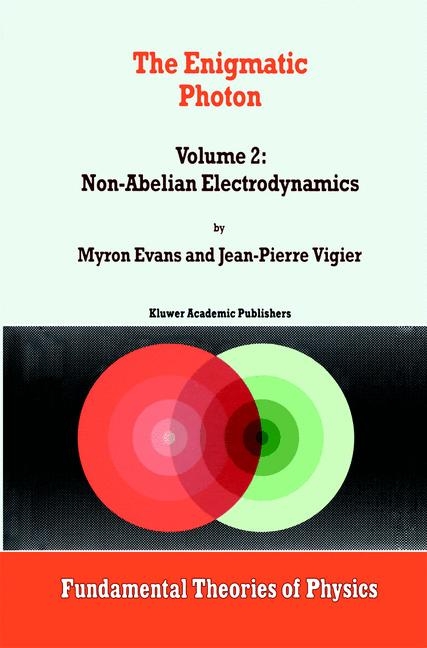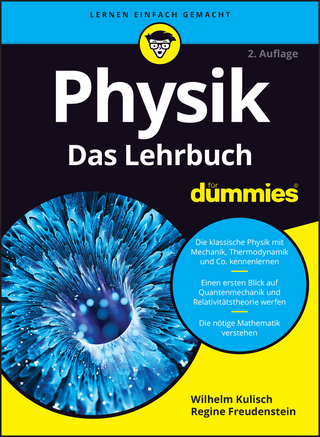
The Enigmatic Photon
Seiten
2002
|
Softcover reprint of the original 1st ed. 1995
Kluwer Academic Publishers (Verlag)
978-1-4020-0517-6 (ISBN)
Kluwer Academic Publishers (Verlag)
978-1-4020-0517-6 (ISBN)
- Titel ist leider vergriffen;
keine Neuauflage - Artikel merken
Presents the systematic development of the fundamental magnetizing field of electromagnetic radiation: the field. This book describes the properties of Ii(3) in a vacuum and in the interaction of light with matter. It opens with the derivation of the novel field Ii(3) from the Dirac equation of relativistic quantum field theory.
This book is a sequel to The Enigmatic Photon. Volume 1: The Field IX(3) (Kluwer Academic Publishers, 1994), which presented the first systematic development of the fundamental magnetizing field of electromagnetic radiation: the field GBPIiGBP(3). Its 12 chapters collectively describe the properties of Ii(3) in a vacuum and in the interaction of light with matter. The present volume deals with the development of the theory of the Evans--Vigier field Ii(3). It opens with the derivation of the novel field Ii(3) from the Dirac equation of relativistic quantum field theory. The existence of Ii(3) in the vacuum means that the gauge group of electromagnetism becomes 0(3), the group of rotations. This is non-Abelian, and so requires a self-consistent development of the vacuum Maxwell equations themselves. The role of Ii(3) is discussed in unified field theory and quantum electrodynamics. The classical vacuum field Ii(3) is a novel, fundamentally important feature of electrodynamics which indicates that the particulate photon carries mass, thus settling a longstanding debate in favour of protagonists of photon mass.
For researchers and graduate students interested in the theory of electromagnetic radiation.
This book is a sequel to The Enigmatic Photon. Volume 1: The Field IX(3) (Kluwer Academic Publishers, 1994), which presented the first systematic development of the fundamental magnetizing field of electromagnetic radiation: the field GBPIiGBP(3). Its 12 chapters collectively describe the properties of Ii(3) in a vacuum and in the interaction of light with matter. The present volume deals with the development of the theory of the Evans--Vigier field Ii(3). It opens with the derivation of the novel field Ii(3) from the Dirac equation of relativistic quantum field theory. The existence of Ii(3) in the vacuum means that the gauge group of electromagnetism becomes 0(3), the group of rotations. This is non-Abelian, and so requires a self-consistent development of the vacuum Maxwell equations themselves. The role of Ii(3) is discussed in unified field theory and quantum electrodynamics. The classical vacuum field Ii(3) is a novel, fundamentally important feature of electrodynamics which indicates that the particulate photon carries mass, thus settling a longstanding debate in favour of protagonists of photon mass.
For researchers and graduate students interested in the theory of electromagnetic radiation.
Preface. 1. IX(3) and the Dirac Equation. 2. IX(3) and the Higgs Phenomenon. 3. IX(3) and Non-Abelian Gauge Geometry. 4. The O(3) Maxwell Equations in the Vacuum. 5. IX(3) in Unified Field Theory. 6. IX(3) in Quantum Electrodynamics. 7. Summary of Arguments and Suggestions for Experimental Verification. Appendices. A: The O(3) Electromagnetic Field Tensor, Gmun, in the Circular Basis (1), (2), (3). B: The O(3) Covariant Derivative (Dmu) in the basis (1), (2), (3). C: The Structural Analogy between NEA and General Relativity. D: Structure of the Field Tensor Gmun(i) of Non-Abelian Electrodynamics. E: Some Details of the Non-Abelian Maxwell Equations in the Vacuum. References. Index.
| Erscheint lt. Verlag | 31.3.2002 |
|---|---|
| Reihe/Serie | Fundamental Theories of Physics ; 68 |
| Zusatzinfo | 1 black & white illustrations |
| Sprache | englisch |
| Maße | 155 x 235 mm |
| Gewicht | 308 g |
| Themenwelt | Naturwissenschaften ► Physik / Astronomie ► Allgemeines / Lexika |
| Naturwissenschaften ► Physik / Astronomie ► Elektrodynamik | |
| ISBN-10 | 1-4020-0517-2 / 1402005172 |
| ISBN-13 | 978-1-4020-0517-6 / 9781402005176 |
| Zustand | Neuware |
| Haben Sie eine Frage zum Produkt? |
Mehr entdecken
aus dem Bereich
aus dem Bereich
Band 1: Mechanik und Thermodynamik
Buch | Softcover (2022)
Wiley-VCH (Verlag)
39,90 €
für Studierende der Naturwissenschaften und Technik
Buch | Hardcover (2024)
Springer Spektrum (Verlag)
79,99 €


